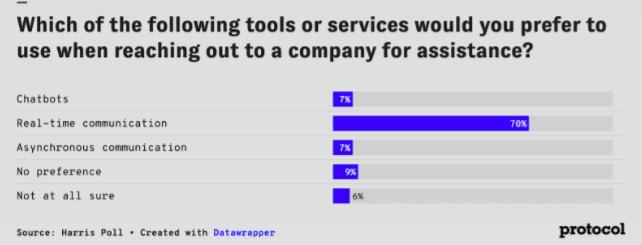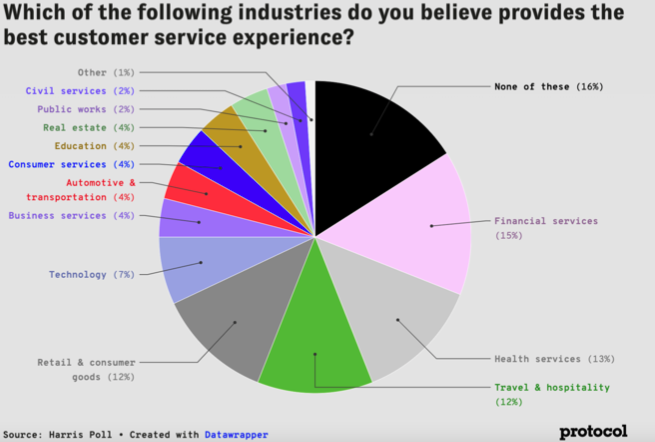Brief • 5 min Read
In The Harris Poll Tracker (Week 134) fielded from September 16th to 18th, 2022 among 2,011 U.S. adults, Americans’ concern about the economy and inflation keep creeping up. Among their worries:
- (89%) the economy and inflation (+2% pts from last week)
- (86%) a potential U.S. recession (+3% pts)
- (73%) affording their living expenses (+4% pts)
And these attitudes show signs of beginning to impact consumer spending confidence as half of Americans (49%) report feeling less comfortable splurging on the things they want to buy and are even spending less this month overall compared to last (44%).
Here’s what else you need to know this week…
If Netflix wants to find a culprit for its business woes, it might look no further than young Americans. New Harris polling finds that Gen Z is America’s largest streaming stealers.
And if you joined Kim Kardashian in calling out Instagram for changing its algorithm to be more like TikTok, you need to read how young people use social for learning and discovery instead of just cute friend photos.
Young people have different attitudes toward customer service as well. New polling with Protocol finds Gen Z will be much more amenable to CX tech tools even if most older Americans clamor to press “0” for a real human being.
Also, the labor market is strong for workers, with temporary workers and younger workers in high demand.
And as a hedge against inflation, our new Roku and Harris Poll 2022 Holiday Survey finds holiday shoppers expect to increase spending on gifts and shop earlier.
And finally, don’t miss our new polling on student loan attitudes in America, with Harris Poll CEO Will Johnson in Newsday.
Check out our America This Week: From The Harris Poll podcast on Spotify and Apple Podcasts with Harris Poll CEO John Gerzema and CSO Libby Rodney on this week’s data and more.
Gen Z Are Dirty, Rotten, Streaming Stealers
According to this weekend’s Harris data, one-third (33%) of Americans are mooching off of family and friends for their streaming logins – which would be around 100 million individuals streaming content under someone else’s account. But Gen Z (ages 10-25) take password grifting to a new level:
- Young streaming criminals: Nearly two-thirds (63%) of Gen Z are using family and friends’ streaming logins to watch content (v. Millennials: 45%, Gen X: 30%, Boomers: 16%).
- Gen Z also steal passwords across most platforms: (62%) of Gen Z also admit using one to five of their family’s or friends’ streaming logins (v. gen pop: 39%) – and among those Gen Z’ers using family’s and friends’ logins, they, on average, are using two logins.
- Gen Z’ers are even streaming on ex’s accounts: It seems login pilfering is the modern equivalent of not returning your ex’s vinyl records. Close to 4 in 10 (37%) Gen Z report having used an ex-partner’s streaming login after a break-up (few weeks: 12%, few months: 13%), with over a tenth (12%) saying they still do currently.
Takeaway: While Harris Poll data has previously found Gen Z to be both fiscally responsible and driven by values and ethics, it may not come as a surprise that they are sneaking on others’ logins, as three-quarters of Gen Z Americans (79%) are worried over affording their living expenses and half (42%) report feeling less confident in spending money overall this month. Tough times seem to bring tough trade-offs.
Say Goodbye To Your Friends, The Algorithm Is Here To Stay
While Boomers would prefer to keep their friends and family in their social media feeds, Gen Z is leading us into a new world of social media algorithms, according to our recent polling this week.
- Gen Z social media users say they would rather see the greater world’s content when active on social media instead of their own family’s and friends’ content (56% v. Gen X: 42%, Boomer: 31%).
- Two-thirds of Gen Z (65%) say that social media algorithms have increased the content they like to consume and be entertained by (v. Gen X: 48%, Boomers: 25%).
- Gen Z believes that algorithms have the potential to share more perspectives (57%, Boomers: 23%), while Boomers are more fearful about algorithms spreading misinformation (77% v. Gen Z: 43%).
- Gen Z is more likely to think TikTok will set the vision for the future of social media (58% v. Boomer: 42%), while Boomers think Instagram will set the vision (58% v. Gen Z: 42%).
Takeaway: Algorithm tweaking has outraged everyone, including Kim Kardashian, who posted, “Make Instagram, Instagram again (stop trying to be TikTok, I just want to see cute photos of my friends).” But Kim’s a Millennial, and Gen Z is using social for search and discovery, not just party pics. This goes to the heart of a changing value system and style of learning focused on video-based education and micro-peer network credibility for news information.
Make sure to check out our America This Week: From The Harris Poll podcast this Friday, where CEO John Gerzema and CSO Libby Rodney will dive into how Gen Z will shape future iterations of social media.
Operator Please, I Want to Talk to Someone: Protocol-Harris Poll
In our latest survey with Protocol, we asked Americans what they want from their experiences as customers: talking to someone on the other end of the phone.

- A large majority of customers (70%) said they still prefer real-time communication over chatbots and asynchronous communication (7%).
- When asked which factors contributed to a good customer experience, two-thirds (67%) said being able to speak to a customer service representative. In contrast, just a fifth (20%) chose chatbots and automated customer assistance systems (16%).
- (50%) feel that their customer service experiences have not changed compared to the start of the pandemic, yet more/over a quarter (27%) say it’s gotten worse (v. better: 21%).

Takeaway: “But if you’re a CXO reading this who just invested in a ton of automation technology, don’t panic just yet. Hope lives with the next generation. Our findings revealed that adults between the ages of 18 and 25 under-indexed on citing the availability of customer service agents as a contributing factor to good customer service. Less than half (45%) cited this, compared to (67%) of all U.S. adults and (77%) of those ages 50 and older. These results indicate that Gen Z will be much more amenable to CX tech tools and may even be ready to say goodbye to the customer service agent — or at least the human version.” (Protocol)
Booming Market for Temporary Workers: Express Employment Professionals-Harris Poll
Even with a cooling economy, hiring efforts in the U.S. continue to climb as hiring decision-makers look to fill empty positions, as we found in a new Harris Poll with Express Employment Professionals:
- Open positions skew to middle management/entry level: Those hiring told us that mid-level (55%) and entry-level (52%) open positions are most needed, with just around three in ten companies planning to hire senior-level employees (31%), individual contributors (26%), and C-suite executives (20%).
- U.S. hiring decision-makers will turn to recent grads, as more than half (51%) say their company plans to hire applicants from this group.
- Yet, given the current labor shortage, some companies may consider more temporary hires: A quarter of hiring managers (24%) report their plans to hire seasonal, temporary, or contract workers – an increase compared to 2021 (20%).
Takeaway: “Today’s workers are searching for flexibility, and with the severe skilled worker shortage, these assignments allow individuals opportunities to gain experience in various environments,” Express Employment International CEO Bill Stoller said. “These shorter working stints can often lead to permanent employment, creating the perfect solution for today’s tight labor market.”
Spending is Steady/Earlier as Americans Prep For Holiday Shopping: Roku-Harris Poll
According to our latest Harris Poll Weekly Tracker data and a recent survey with Roku, even in midst of record inflation, Americans are preparing for the holiday shopping season by saving now.
- We found over three-quarters of Americans (78%) report prioritizing more on saving and staying within their budget because of rising inflation rather than spending their money typically (22%).
- Close to half (44%) even reported spending less money overall this month compared to last, especially on big-ticket purchases (less: 48%).
- Yet despite inflation this holiday season, Americans plan to spend an average of $993 on holiday gifts, a (6%) increase from 2021.
- And more than half of the holiday shoppers (56%) either started or will start saving earlier this year to prepare for the holiday season, including (70%) of Millennials.
Takeaway: “We see that holiday shoppers are not only spending more time streaming content but also looking up brand or product reviews after seeing an ad at record rates. This offers brands the opportunity to differentiate and engage with their audiences in ways that don’t exist on traditional TV,” said Connie Xu, Director of Brand Strategy at The Harris Poll.
Finding Common Ground on Student Loan Debt: New York Daily News-Harris Poll
According to our CEO Will Johnson, in his latest op-ed for New York Daily News, nearly three-quarters of Americans say that the country’s $1.62 trillion in outstanding student loans qualifies as a crisis – but the closest thing to philosophy the public displays when it comes to addressing that crisis is informed self-interest.
(54%) of the public supports the Administration’s plan to forgive up to $20,000 in federal loans, halving the minimum monthly payment from 10 to 5 percent (68%), and extending the COVID-era moratorium on loan payments through year’s end (63%).
- There is a healthy element of self-interest at work: Nearly four in five current loan-holders support the debt-forgiveness, yet, the figure drops to (54%) among those who no longer have loans.
- But self-interest can lead to contradictory and even incoherent beliefs: Solid majorities say both that forgiving loans now is unfair to those who have already paid off their debts (73%) and also that Biden’s proposal does not go far enough to help borrowers (61%).
- Two-thirds of Americans – including (65%) of Republicans and Democrats alike – favor giving those who have already paid off their student loans a refund equivalent to the debt forgiveness current debtors are in line to enjoy, for example.
Takeaway: According to Johnson, “The area on which Americans most agree, however, has largely been unaddressed by the debate thus far. More than four out of five Americans (including 82% of Democrats and 86% of Republicans) said that lowering the cost of tuition is more important than forgiving student debt – which only makes sense. Debt forgiveness is ultimately just a bandage if the underlying cause is not addressed – and there’s a legitimate concern that paying debt down now will only send the cost of college higher.”
Subscribe for more Insights
Subscribe to our newsletter for the latest trends in business, politics, culture, and more.
Download the Data
This survey was conducted online within the U.S. by The Harris Poll from September 16th to 18th, among a nationally representative sample of 2,011 U.S. adults.
Download
Subscribe for more Insights
Subscribe to our newsletter for the latest trends in business, politics, culture, and more.
Download the Data
This survey was conducted online within the U.S. by The Harris Poll from September 16th to 18th, among a nationally representative sample of 2,011 U.S. adults.
DownloadRelated Content







